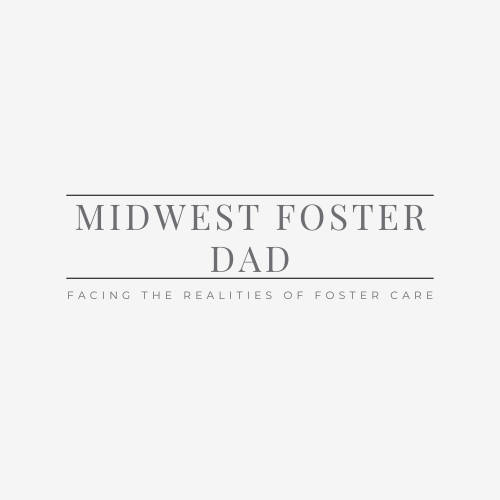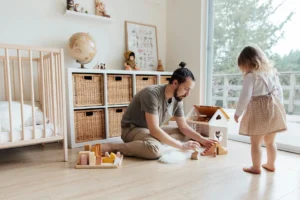As an Amazon Associate I earn from qualifying purchases. This post contains affiliate links, meaning I may receive a small commission at no extra cost to you if you decide to make a purchase. Thank you for supporting our blog!
Table of Contents
Saying Goodbye to a Foster Child: The Hardest Part of Fostering
The day I had to say goodbye to my foster son, C, was one of the hardest of my life. My wife and I sat on our bed, waiting for the call we both dreaded. When her phone rang and the caseworker’s name flashed on the screen, I knew. My heart felt like it had been ripped out of my chest. Saying goodbye to a foster child isn’t something you ever get used to. It’s gut-wrenching, painful, and unfair—but I’d still do it all over again.
What Do the Numbers Say?

Foster care is built with the goal of reunification. Statistics show that 46% of foster children reunify with their parents, while 33% are placed with relatives through kinship care. Only 21% of children in foster care are adopted. These numbers highlight a hard truth—foster care isn’t designed for adoption. It’s designed to heal families whenever possible. But that reality doesn’t make saying goodbye any easier.
“Foster parents do experience significant grief upon the loss of their children, and this emotion takes several forms and affects the recruitment and retention of carers.” ResearchGate
Having the right mindset is important if you want to be a good foster parent. Adoption can happen, but it shouldn’t be your main reason for fostering. Your goal should be to provide kids with a safe, loving home while helping them reunite with their families.
Foster care means helping kids feel safe and loved, but it also means helping their parents get better. Often, parents have problems they need to fix. As a foster parent, you can show them what good parenting looks like. Talk to them, be friendly, and encourage them. Your goal should be to help the child return home, not to adopt them.
Think carefully about this: if you’re only interested in adopting, be honest about it. Talk openly with your foster agency and caseworker from the start. Being clear from the beginning helps everyone, especially the child.
Ask yourself this question honestly: Can you support a child going back home, even if it’s hard? Foster care is about helping families heal. By understanding this, you can make a big difference in a child’s life.
The Emotional Impact of Foster Care: A Love Without Guarantees
Foster parenting comes with an impossible contradiction: you are asked to love a child like your own while knowing they will likely leave. People always ask, “How do you handle getting attached?” The truth? You don’t handle it. You just do it anyway.
C came into our lives as a three-year-old with a traumatic past. His mother had overdosed while he was in the house. His father was battling addiction and unable to care for him. For months, we were told there was no family for him, that adoption was the plan. So we let ourselves believe he was staying. We built routines, shared bedtime stories, and let him call us “Mommy and Daddy.”
He changed our whole world. Our entire lives changed to revolve around him in the best way possible. C had his own challenges, and there were definitely difficult times and sleepless nights, but boy oh boy did I love that kid and still do.
Then, seven months in, we got the news. A relative came forward. Just like that, everything changed.
Our situation was not unique. Kinship placements happen often in foster care, sometimes out of nowhere. Caseworkers prioritize family connections, even if relatives weren’t initially involved. Sometimes the extended family doesn’t even know the kids are in foster care. We all have family we only see a couple times a year. There could be any number of reasons. It can be extremely frustrating as a foster parent.
I asked myself so many times “Why did they wait years before they decided they want him?”
We had gone from planning a future with C to packing his bags, preparing to say goodbye in what felt like the blink of an eye. I tend to be a person who keeps their emotions bottled up pretty tightly, but the emotional toll this took on me was immense.
Unexpected Kinship Placements: When Family Shows Up Late
This happens a lot in foster care. Why do relatives come forward at the last minute? Sometimes they don’t know the child is in care. Other times, they hesitate because they’re unsure if they can handle it. But once they step up, the system prioritizes placing children with biological family.
Common Reasons Relatives Step In Late
- Didn’t know the child was in foster care – Lack of communication from agencies or family members can delay a relative’s awareness.
- Hesitation due to financial burden – Family members may be hesitant to step forward due to concerns about financial stability.
- Uncertainty about parenting ability – Some relatives feel unsure about their ability to take on the responsibility of raising a child.
- Complex family dynamics – Prior conflicts, estrangement, or strained relationships with the child’s parents can create hesitation.
How to Cope When a Foster Child Leaves
The transition was fast. First, a short visit. Then, an overnight. Then, a weekend. After that, we had a week to prepare for him to move permanently.
We spent our last day together playing, laughing, pretending everything was normal. When the caseworker arrived, I held it together long enough to hug him and remind him to be good in the car. But the second he walked out the door, I broke.
The first night without him was long. His room was too quiet. I kept expecting to hear his little voice. I found his toy car under the couch and lost it all over again.
People don’t talk enough about what happens to foster parents when a foster child leaves. The house feels empty. Your arms feel empty. And you have to grieve a child who is still alive, just no longer yours.
For anyone facing this loss, here are a few things that helped me cope:
- Lean on your support system. Talk to friends, family, or a therapist. Don’t hold it in.
- Create a memory book. Even if you never see them again, keeping pictures and notes can be a source of comfort.
- Remember why you foster. It’s about them, not us. If they’re safe and loved, we’ve done our job.
After the Goodbye: How Life Moves Forward
It’s natural to feel sad. You are quite literally grieving the loss of a child. It’s okay to hurt for a little while. We each adapt and move forward at our own pace. What helps me begin to move on may not help someone else. This is why it’s important to have healthy coping methods. A coping method of mine is writing. This blog is a form of coping for me. Something like this Guided Grief Journal on Amazon is great to help get your thoughts down on paper. There’s something about writing that just relieves some of the pressure.
For me, I had things naturally occurring to help me. I still had my foster daughter, and a month later a new foster placement we accepted. Whether I liked it or not, life was moving on. I had to adjust quickly and push through.
Additional Resources
Books(Amazon Affiliate Links)
- It’s OK That You’re Not OK: Meeting Grief and Loss in a Culture That Doesn’t Understand by Megan Devine
- A Grief Observed by C.S. Lewis
- Bearing the Unbearable: Love, Loss, and the Heartbreaking Path of Grief by Dr. Joanne Cacciatore
Free Online Resources
| Resource Name | Type of Resource | Key Features | URL |
| Experiencing Grief (DCYF) | Educational Guide | Understanding grief in foster care, coping suggestions, validation of feelings. | https://www.dcyf.wa.gov/sites/default/files/pdf/ExperiencingGrief.pdf |
| GriefShare | Virtual Support Group | Weekly online and in-person groups, expert videos, discussion forums. | https://www.griefshare.org/ |
| Refuge in Grief | Mental Health Support | Podcast, videos, book on navigating grief, validation of difficult emotions. | https://refugeingrief.com/ |
| Various Resources (Coalition for CYF) | Comprehensive Resource | Tip sheets, webinars, videos, curated links on grief and loss in foster care. | https://coalitionforcyf.org/2021/03/01/resources-for-grief-loss/ |
| Building Bridges of Hope After Loss (NFPA TI) | Educational Workbook | Self-directed guide covering grief dynamics, coping strategies, and saying goodbye activities for foster parents. | https://nfpati.org/courses/building-bridges-of-hope-after-loss-a-self-directed-workbook-for-foster-parents-self-directed-study/ |
Final Thoughts: The Love Never Leaves
Despite the pain and heartbreak, I don’t regret it. Not for a single second. For 8 months, I gave a child all the love and support I possibly could and made their life a little better. Foster care isn’t about me, or my feelings. It’s about them. Kids need, and deserve, unconditional love especially kids in foster care who have experienced unthinkable traumas.
If you’re a foster parent preparing to say goodbye, just know this: the love you give them matters. They may not remember every detail, but they will remember feeling safe.
If you’re interested in learning more about my journey from being a caseworker and guardian ad litem to becoming a foster parent, check out my first blog post: From Caseworker to Foster Parent: A Personal Chronicle
FAQ: Saying Goodbye to a Foster Child
1. How do foster parents cope with losing a child?
It’s like grieving, but without closure. Lean on your support system, allow yourself to grieve, and remind yourself that your love made a difference.
2. Can foster parents keep in touch with children after reunification?
Sometimes, but not always. It depends on the biological family’s willingness to maintain contact.
3. Why do relatives come forward at the last minute in foster care?
Many don’t realize the child is in care, and others hesitate until they’re confident they can take custody.
4. How do you prepare for a foster child leaving?
Make the transition as smooth as possible for them. Talk about the move positively, remind them they are loved, and let them take comfort items with them.
5. Is it worth fostering if you know you’ll have to say goodbye?
Absolutely. Every moment of love and stability you give a child is worth it, even if it’s temporary.
Want to support foster families? Share this post or leave a comment with your thoughts. Your words might be exactly what another foster parent needs to hear today. Sign up for my newsletter to receive updates when I post new articles!




